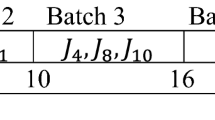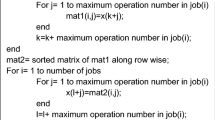Abstract
A variation of customer demand over time periods has resulted in production layout’s efficiency especially in term of material handling cost. Machine re-location approach can help to maintain the flow distances but the costs related to the machine movement may be imposed. Cooperative redesigning of machine layouts between time periods was proposed to minimise both material handling and relocation costs. In this work, Teaching-Learning-Based Optimisation (TLBO) and its modifications were applied to solve non-identical machine layout redesign (MLRD) problem in multi-period multi-row configuration with demand uncertainty scenario. The computational experiments were carried out using eleven benchmarking datasets. The performance of the proposed methods was compared with the conventional Genetic Algorithm, Backtracking Search Algorithm. The effect of relocation cost on the layout design approach was also investigated.
Access this chapter
Tax calculation will be finalised at checkout
Purchases are for personal use only
Similar content being viewed by others
References
McKendall, A.R., Shang, J., Kuppusamy, S.: Simulated annealing heuristics for the dynamic facility layout problem. Comput. Oper. Res. 33, 2431–2444 (2006)
Tompkins, J.A., White, J.A., Bozer, Y.A., Tanchoco, J.M.A.: Facilities Planning, 4th edn. John Wiley & Sons, Inc, Hoboken (2010)
Kulturel-Konak, S.: Approaches to uncertainties in facility layout problems: Perspectives at the beginning of the 21(st) Century. J. Intell. Manuf. 18, 273–284 (2007)
Chen, G.Y.H., Lo, J.-C.: Dynamic facility layout with multi-objectives. Asia Pac. J. Oper. Res. 31, 1450027 (2014)
Ghosh, T., Doloi, B., Dan, P.K.: An Immune Genetic algorithm for inter-cell layout problem in cellular manufacturing system. Prod. Eng. Res. Devel. 10(2), 157–174 (2015). https://doi.org/10.1007/s11740-015-0645-4
Derakhshan Asl, A., Wong, K.Y.: Solving unequal-area static and dynamic facility layout problems using modified particle swarm optimization. J. Intell. Manuf. 28(6), 1317–1336 (2015). https://doi.org/10.1007/s10845-015-1053-5
Rao, R.V., Savsani, V.J., Vakharia, D.P.: Teaching-learning-based optimization: a novel method for constrained mechanical design optimization problems. Comput.-Aid. Des. 43, 303–315 (2011)
Panda, S., Panda, S.N., Nanda, P., Mishra, D.: Comparative study on optimum design of rolling element bearing. Tribol. Int. 92, 595–604 (2015)
Shao, W.S., Pi, D.C., Shao, Z.S.: A hybrid discrete optimization algorithm based on teaching-probabilistic learning mechanism for no-wait flow shop scheduling. Knowl.-Based Syst. 107, 219–234 (2016)
Bhattacharyya, B., Babu, R.: Teaching learning based optimization algorithm for reactive power planning. Int. J. Electr. Power Energ. Syst. 81, 248–253 (2016)
Tang, Li., Wang, Y., Ding, X., Yin, H., Xiong, R., Huang, S.: Topological local-metric framework for mobile robots navigation: a long term perspective. Auton. Rob. 43(1), 197–211 (2018). https://doi.org/10.1007/s10514-018-9724-7
Rao, R.V., Kalyankar, V.D.: Multi-objective multi-parameter optimization of the industrial LBW process using a new optimization algorithm. Proc. Inst. Mech. Eng. Part B-J. Eng. Manuf. 226, 1018–1025 (2012)
Verma, P., Om, H.: A novel approach for text summarization using optimal combination of sentence scoring methods. Sādhanā 44(5), 1–15 (2019). https://doi.org/10.1007/s12046-019-1082-4
Tuo, S.H., He, H.: Solving complex cardinality constrained mean variance portfolio optimization problems using hybrid HS and TLBO algorithm. Econ. Comput. Econ. Cybern. Stud. 52, 231–248 (2018)
Singh, S., Ashok, A., Kumar, M., Rawat, T.K.: Adaptive infinite impulse response system identification using teacher learner based optimization algorithm. Appl. Intell. 49(5), 1785–1802 (2018). https://doi.org/10.1007/s10489-018-1354-4
Pourvaziri, H., Naderi, B.: A hybrid multi-population genetic algorithm for the dynamic facility layout problem. Appl. Soft Comput. 24, 457–469 (2014)
Samarghandi, H., Taabayan, P., Behroozi, M.: Metaheuristics for fuzzy dynamic facility layout problem with unequal area constraints and closeness ratings. Int. J. Adv. Manuf. Tech. 67, 2701–2715 (2013)
Moslemipour, G., Lee, T.S., Loong, Y.T.: Performance Analysis of Intelligent Robust Facility Layout Design. Chin. J. Mech. Eng. 30(2), 407–418 (2017). https://doi.org/10.1007/s10033-017-0073-9
Hosseini, S., Al Khaled, A., Vadlamani, S.: Hybrid imperialist competitive algorithm, variable neighborhood search, and simulated annealing for dynamic facility layout problem. Neural Comput. Appl. 25, 1871–1885 (2014)
Montreuil, B., Laforge, A.: Dynamic layout design given a scenario tree of probable futures. Eur. J. Oper. Res. 63, 271–286 (1992)
Corry, P., Kozan, E.: Ant colony optimisation for machine layout problems. Comput. Optim. Appl. 28, 287–310 (2004)
Vitayasak, S., Pongcharoen, P.: Performance improvement of Teaching-Learning-Based Optimisation for robust machine layout design. Expert Syst. Appl. 98, 129–152 (2018)
Vitayasak, S., Pongcharoen, P., Hicks, C.: Robust machine layout design under dynamic environment: Dynamic customer demand and machine maintenance. Expert Syst. Appl. X 3, 100015 (2019)
Vitayasak, S., Pongcharoen, P., Hicks, C.: A tool for solving stochastic dynamic facility layout problems with stochastic demand using either a Genetic Algorithm or modified Backtracking Search Algorithm. Int. J. Prod. Econ. 190, 146–157 (2017)
Acknowledgement
This work was part of the research project supported by the Thailand Research Fund under the grant number MRG6280168.
Author information
Authors and Affiliations
Corresponding author
Editor information
Editors and Affiliations
Rights and permissions
Copyright information
© 2020 Springer Nature Switzerland AG
About this paper
Cite this paper
Vitayasak, S., Pongcharoen, P. (2020). Cooperative Designing of Machine Layout Using Teaching Learning Based Optimisation and Its Modifications. In: Luo, Y. (eds) Cooperative Design, Visualization, and Engineering. CDVE 2020. Lecture Notes in Computer Science(), vol 12341. Springer, Cham. https://doi.org/10.1007/978-3-030-60816-3_16
Download citation
DOI: https://doi.org/10.1007/978-3-030-60816-3_16
Published:
Publisher Name: Springer, Cham
Print ISBN: 978-3-030-60815-6
Online ISBN: 978-3-030-60816-3
eBook Packages: Computer ScienceComputer Science (R0)




